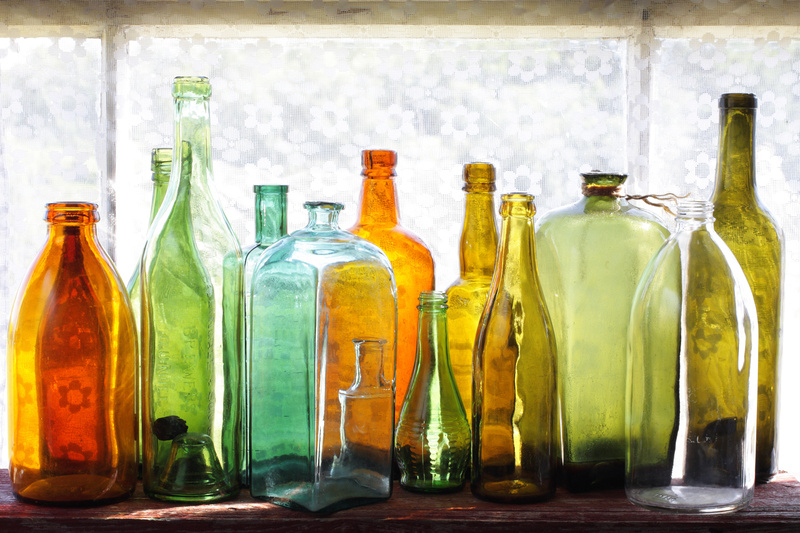Go Green When Disposing of Your Old Kitchen Pots and Pans: Sustainable Solutions for a Cleaner Planet
Have you recently upgraded your cookware or discovered a pile of unused kitchen pots and pans at the back of your cupboard? Before tossing them into the trash, consider the environmental impact of traditional disposal methods. Going green when disposing of your old kitchen pots and pans isn't just an eco-friendly trend - it's an impactful decision that helps reduce landfill waste, conserve natural resources, and even give your cookware a second life.
Why Responsible Disposal Matters
Each year, millions of tons of kitchenware, including cookware and utensils, are sent to landfills. Pots and pans are often made from materials such as aluminum, stainless steel, copper, and non-stick coatings, many of which do not decompose and can leach harmful chemicals into the soil.
By choosing eco-friendly disposal methods, you help divert these materials from landfills, reduce pollution, and encourage a circular economy that values reusing and recycling. Read on to know how you can go green when disposing of your old kitchen pots and pans.

The Environmental Impact of Improper Disposal
- Landfill Overflow: Cookware, especially those made with synthetic coatings, takes decades or even centuries to break down.
- Toxic Runoff: Non-stick coatings can release harmful chemicals like PFOA and PTFE into the environment when not handled properly.
- Resource Waste: When metal cookware isn't recycled, valuable resources are lost rather than being reused in new products.
Going green with your old cookware is a responsible and sustainable approach to cleaning out your kitchen.
Options for Eco-Friendly Disposal of Old Cooking Pots and Pans
There are multiple ways to go green when parting ways with cookware. Below are the best strategies for environmentally friendly disposal of pots and pans:
1. Donate Usable Pots and Pans
- Charity Thrift Stores: Organizations such as Goodwill and The Salvation Army often accept cookware in reusable condition.
- Local Shelters and Soup Kitchens: Many community organizations appreciate donations of gently used pots and pans for their kitchens.
- Online Marketplaces: Websites like Craigslist, Facebook Marketplace, and Freecycle allow you to give away or sell old cookware to someone who will continue to use them.
Before donating:
- Clean your pots and pans thoroughly.
- Ensure they are still functional, without severe warping, flaking, or severe rust.
- Check the organization's donation policy.
Donating is a double win: it extends the lifespan of your cookware and aids those in need.
2. Reuse & Repurpose in Creative Ways
If your cookware is no longer suited for cooking, consider repurposing it for other uses around the home or garden. Here are some creative, eco-friendly ideas:
- Planters and Garden Containers: Turn old pots into unique home for herbs, flowers, or succulents. Just add some drainage holes.
- Storage Bins: Use deep pans or stockpots to organize small garden tools, art supplies, or craft materials.
- Decorative Items: Paint and decorate pans as wall art or rustic kitchen decor.
- Birdbaths or Feeders: Shallow pans can become charming additions to your backyard for feeding birds or small animals.
Tip: Get the family involved in a DIY project to give your old cookware a new life!
3. Recycle Your Cookware
Recycling is perhaps the greenest option when it comes to disposing of damaged or unusable pots and pans. Most cookware is made from metals that can be recycled, such as aluminum, stainless steel, and cast iron. Here's how you can recycle old kitchen pots and pans responsibly:
- Check Local Recycling Facilities: Not all curbside recycling programs accept cookware. Search for local scrap metal yards or recycling centers that take household metals.
- Remove Non-Metal Parts: Handles made of plastic, silicone, or wood should be separated. If possible, detach any non-metal parts before recycling.
- Non-Stick Cookware Caution: Pans with Teflon or similar non-stick coatings are often rejected by recyclers. Research specialized facilities or manufacturer take-back programs that accept non-stick cookware.
- For Large Loads: If you're getting rid of multiple pots and pans, ask the recycling center about bulk drop-off policies.
Always call ahead to ensure your chosen facility will accept your specific type of cookware.
4. Manufacturer Take-Back Programs
Some cookware brands and retailers offer take-back or mail-in recycling programs especially for non-stick pans and specialty metals. These manufacturers often have established recycling partnerships to process discarded products responsibly.
- GreenPan: Accepts old pans for recycling with certain purchase programs.
- Calphalon ReNew: Offers a take-back program for its non-stick pans, ensuring proper recycling.
- TerraCycle: Provides recycling solutions for hard-to-recycle items, including non-stick cookware, through paid collection boxes.
Check company websites or customer service resources for current information on eco-friendly cookware disposal options.
5. Local Community Recycling Events
Many communities organize seasonal recycling events where residents can drop off items that are not typically accepted in curbside bins. These events are perfect for recycling kitchenware, small appliances, and other scrap metals.
- Check your city or municipality's website for event schedules.
- Some events may have specific guidelines or registration requirements.
- Bring proof of residency if required.
Special Considerations for Non-Stick and Coated Pans
Non-stick cookware, beloved for its easy-release surfaces, poses unique recycling challenges because of the chemical coatings involved. Most standard recycling facilities cannot accept Teflon-coated or ceramic-coated pans due to contamination risks and the technical difficulty of separating the base metal from the coating.
- Never dispose of non-stick pans in the landfill, as the chemical coatings can break down and release toxins.
- Search for take-back programs from manufacturers or paid mail-in services like TerraCycle.
- If no recycling route is available, consider repurposing the pan for non-food uses (e.g., paint tray, hardware organizer).
Always read manufacturer guidelines and local disposal regulations regarding coated cookware.
Frequently Asked Questions About Green Disposal Methods
Can you put old pots and pans in the recycling bin?
In many cases, standard curbside recycling bins do not accept pots and pans because their size and materials can damage sorting equipment. Always contact your local recycling center or look for scrap metal recycling facilities.
Are rusty pans recyclable?
Yes, rusted pans made from pure metal (such as cast iron or stainless steel) are recyclable. However, ensure you remove as much non-metal material as possible and check with the recycling center first.
What to do with pots and pans that can't be recycled or donated?
Repurposing is the next best option. Turn them into storage containers, garden tools, crafts, or decorative items. If all else fails, seek out specialized disposal companies who process mixed or hazardous household waste responsibly.
Tips to Extend the Lifespan of Your Cookware
Going green begins with prolonging the life of what you already own. Here are some tips to help your current pots and pans last longer and reduce waste in the future:
- Use Gentle Utensils: Stick to wooden, silicone, or plastic utensils with non-stick and coated cookware to prevent scratching.
- Hand Washing: Even if your pots are dishwasher-safe, hand washing preserves coatings and reduces wear.
- Avoid High Heat: Excessive heat can warp cookware and damage non-stick surfaces.
- Proper Storage: Use pan protectors or cloths to prevent scratching and denting when stacking cookware.
- Quick Repairs: Try re-seasoning cast iron or tightening loose handles before giving up on a pan.

Shop Sustainably for Future Cookware
Once you've successfully gone green with your old kitchen pots and pans, make sure your next purchase supports the planet:
- Choose products made from recycled materials or designed for recyclability.
- Opt for brands with take-back or environmentally responsible recycling programs.
- Avoid cheap, disposable cookware that tends to break quickly and ends up in the trash.
- Invest in quality, durable pots and pans that can be repaired or re-seasoned as needed.
What are the most eco-friendly cookware materials?
Stainless steel, cast iron, carbon steel, and responsibly sourced ceramics are among the most sustainable choices when shopping for new cookware. These materials last for decades, are free from harmful coatings, and can easily be recycled or repurposed.
Conclusion: Every Step Toward Going Green Counts
Going green when disposing of your old kitchen pots and pans is an attainable and impactful step towards reducing your environmental footprint. Whether you choose to donate, recycle, repurpose, or participate in manufacturer programs, every sustainable action you take helps protect the planet for future generations.
Remember: The kitchen is the heart of the home - and with eco-friendly habits, it can be the heart of a greener life too. Instead of throwing away old pots and pans, make a conscious choice today to dispose of them in a way that's responsible and earth-friendly.
Ready to go green with your old cookware? Share your creative reuse ideas and recycling tips with friends and family!
Key Takeaways for Eco-Friendly Pot and Pan Disposal
- Donate safe, usable cookware to charities and community organizations.
- Repurpose old pots and pans to give them new life as planters, organizers, or art.
- Recycle metal cookware at a specialized scrap metal or recycling facility.
- Avoid landfill disposal--especially for non-stick pans, due to toxic chemicals.
- Participate in manufacturer take-back programs whenever available.
- Choose sustainable cookware made from durable, recyclable materials in the future.
Every small step adds up. Take action today and help make the world a cleaner, greener place--starting in your kitchen!
